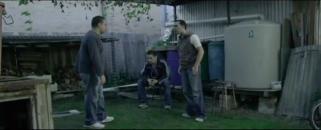AustLit
The material on this page is available to AustLit subscribers. If you are a subscriber or are from a subscribing organisation, please log in to gain full access. To explore options for subscribing to this unique teaching, research, and publishing resource for Australian culture and storytelling, please contact us or find out more.
Latest Issues
AbstractHistoryArchive Description
'A young Lebanese panel beater, struggling to realise his dreams, is offered a chance to set himself up for life. All he has to do is follow a plan to outsmart the cops and a gang of serious criminals. He wants the prize, but is he ready to pay the price?'
Source: Cedar Boys website, http://www.cedarboysthemovie.com/
Sighted: 11/11/2008
Publication Details of Only Known VersionEarliest 2 Known Versions of
Works about this Work
-
Reel Bad Lebs
2019
single work
essay
— Appears in: Cordite Poetry Review , 5 December no. 94 2019; 'Up until I was nine years old, my favourite film was Blood Sport. Frank Dux, who was played by Van Damme in the prime of his career, competed against the world’s best fighters in the underground martial arts tournament called the Kumite. Early in the film, a brown-skinned man in a traditional Saudi headdress named Hossein tries to force the white female lead, Janice, upstairs to his hotel room for an ‘interview’. When she refuses, Hossein raises his open hand to slap her. Fortunately, Frank Dux intervenes, grabbing Hossein’s arm and winning a bet against him, which spares the blonde-haired damsel from imminent physical and sexual assault. As a result, Frank gets the girl the consensual way – they take a friendly walk, making fun of Hossein as they meander, they have a romantic dinner and then they head back to Frank’s hotel room for a wholesome night of procreation.' (Introduction) -
Inside the outside : Aspirations of Authenticity in the Representation of Lebanese-Australian Youth in Serhat Caradee's Cedar Boys
2013
single work
criticism
— Appears in: Studies in Australasian Cinema , September vol. 6 no. 3 2013; (p. 251-261) 'This article examines the claims of truth and authenticity that accompanied the 2009 release of the Australian film Cedar Boys (Caradee, 2009) in its representation of Lebanese-Australian youth as a cultural minority group in Australia. Critical responses in Australia were enthusiastic about what was interpreted as a positive representation of a cultural minority group that is often maligned in mainstream Australian media, particularly since the race riots in Sydney in 2005 which saw violent clashes between groups of Lebanese-Australian and Anglo-Australian youths. This article argues that, far from transcending the cultural stereotypes that abound in the media, Cedar Boys reinforces a cultural `atrophy', characterized in the film by the young Lebanese-Australian protagonist's failed pursuit of a blonde white woman who, in addition to her sexual allure in the eyes of the young man, represents a seemingly unattainable `trophy' of mutual cultural understanding between mainstream and minority in the bleak landscape that is mapped out in the film for the Lebanese-Australian youth.' (Author's abstract) -
Nowhere Near Hollywood
2009
single work
criticism
— Appears in: The Monthly , December no. 52 2009; (p. 44-52) There is a special sort of loneliness about sitting in a cinema on your own. Over the past year, I have frequently found myself watching an Australian movie as the sole member of an audience and, on three occasions, with only one other person in the cinema. Once the lights go down, it can be an uncomfortable, even spooky, feeling of detachment. Movie-going should be a communal activity of human smells, the eating of food, united laughter and tears. It heightens our pleasure to be able to share common experience in a dark cave, entranced by what is happening on the giant screen filled with light. Unfortunately that didn't happen to me very often, and the solitude probably made some dark films even grimmer. -
Resisting Tarantino
2009
single work
criticism
— Appears in: Australian Book Review , December 2009 - January 2010 no. 317 2009; (p. 45-47) -
[Review] Samson and Delilah
2009
single work
column
— Appears in: The Australian , 16 September 2009; (p. 17)
-
Grungy, Sad and Realistic
2009
single work
review
— Appears in: The Canberra Times , 1 August 2009; (p. 26)
— Review of Cedar Boys 2008 single work film/TV -
Cultural Divide
2009
single work
review
— Appears in: The Weekend Australian , 1-2 August 2009; (p. 20)
— Review of Cedar Boys 2008 single work film/TV ; Lake Mungo 2007 single work film/TV -
Untitled
2009
single work
review
— Appears in: The Sunday Age , 2 August 2009; (p. 24) The Sun-Herald , 2 August 2009; (p. 10)
— Review of Cedar Boys 2008 single work film/TV -
Fast Track to the High Life
2009
single work
review
— Appears in: The Sydney Morning Herald , 1-2 August 2009; (p. 17)
— Review of Cedar Boys 2008 single work film/TV -
Pressures and Temptations in Western Sydney
2009
single work
review
— Appears in: The Age , 30 July 2009; (p. 18)
— Review of Cedar Boys 2008 single work film/TV -
Lebanese Story
2008
single work
column
— Appears in: The Weekend Australian Magazine , 8-9 November 2008; (p. 26-28, 30) -
Way Out on the Gritty Side
2009
single work
column
— Appears in: The Canberra Times , 25 July 2009; (p. 23) -
Race Riots and the Multiplex
2009
single work
criticism
— Appears in: Eureka Street , 31 July vol. 19 no. 14 2009; -
Effecting Change by Storytelling
2009
single work
correspondence
— Appears in: The Age , 7 August 2009; (p. 12) Matthew Dabner responds to an earlier comment by Joseph Wakim in which Wakim wonders why, in films like Cedar Boys and The Combination, young Lebanese men are portrayed as criminals. -
Director Sees Racism First-hand
2009
single work
column
— Appears in: Illawarra Mercury , 3 September 2009; (p. 47)
Awards
- 2009 nominated Australian Film Institute Awards — Best Original Screenplay
- 2009 nominated Inside Film Awards — Best Feature Film
- 2009 shortlisted Queensland Premier's Literary Awards — Best Film Script
- 2009 nominated AWGIE Awards — Film Award — Feature Film Original
Last amended 30 Sep 2014 14:22:02
Settings:
- Urban,
Export this record





